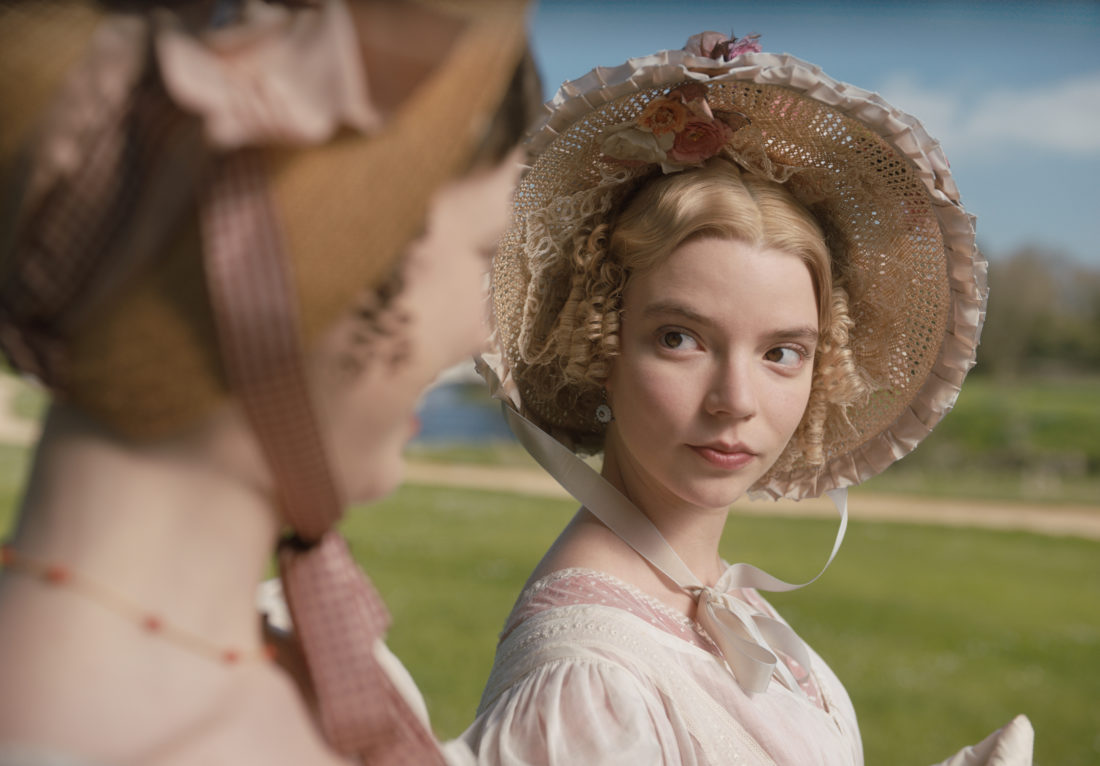Generation after generation, be it on the big screen or small screen, the world can’t get enough of Jane Austen. The latest continuer of this fascination is photographer and music video director Autumn de Wilde, who makes her feature film debut with an adaptation of Austen’s classic 1815 novel, Emma. With de Wilde’s sensibilities, the film is aesthetically wonderful and, along with screenwriter Eleanor Catton, she manages to refresh the story with a modernity that may appeal to contemporary audiences. But beyond that, there’s nothing that elevates it beyond its predecessors.
For the uninitiated, Emma. tells the story of a “handsome, clever and rich” young woman with a penchant for matchmaking. The matchmaking, of course, goes awry, our heroine’s cleverness will get the best of her, and those in need of it will get their comeuppance, but love will find a way. (This is Jane Austen, after all).
The titular Miss Woodhouse is played by Anya Taylor-Joy (The Witch), who has the dramatic and comedic skills to pull off the blithe certainty of Emma’s antics, despite her performance almost being undone by a distracting mass of ringlets atop her coiffure. Taylor-Joy has great chemistry with Mia Goth (Suspiria), who plays the low-born Miss Smith, whom Emma takes under her wing. They are joined by a cast of talented — if not slightly miscast — actors, including Johnny Flynn (Beast), whose broody Mr. Knightly never quite seems at ease in his Regency breeches and ruffled cravat. The ensemble benefits enormously from the presence of the always brilliant Bill Nighy (Love Actually) as Emma’s loving father. The actor’s genius facial expressions and comedic talents are the perfect foil for Mr. Woodhouse’s excitable and hypochondriac tendencies.
Awareness of social standing is a key character trait in Austen’s writing, but the filmmakers imbue Emma. with a class consciousness that paints a ridiculous picture of our aristocratic ensemble, using over-the-top feasts of fantastically decorated and prepared food and servants being barked at as to which flower to cut. There’s also time spent showing servants dressing their employers. In one such early scene, de Wilde sets a tone for the film from a female lens when Mr. Knightly’s bare backside is gratuitously shown with little modesty. These are elements that would not likely have appeared prior to an Occupy Wall Street and #MeToo world.
For those who clear their Sunday nights for the latest costume drama on “Masterpiece” or have dog-eared, tea-stained copies of Ms. Austen’s work, you’ll likely find Emma. a pleasant enough distraction, albeit somewhat lacking. However, given the source material, it really can’t go that wrong. And, ultimately, de Wilde’s film manages to satiate the desire for the morally satisfying, happy ending that only Austen can deliver.
Starts March 5 at the Fine Arts Theatre




Before you comment
The comments section is here to provide a platform for civil dialogue on the issues we face together as a local community. Xpress is committed to offering this platform for all voices, but when the tone of the discussion gets nasty or strays off topic, we believe many people choose not to participate. Xpress editors are determined to moderate comments to ensure a constructive interchange is maintained. All comments judged not to be in keeping with the spirit of civil discourse will be removed and repeat violators will be banned. See here for our terms of service. Thank you for being part of this effort to promote respectful discussion.